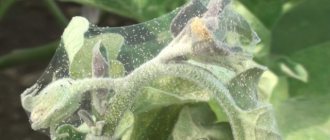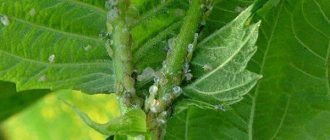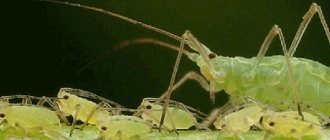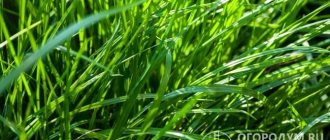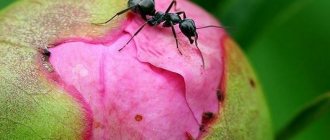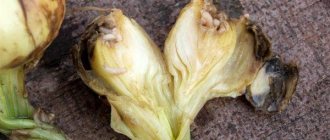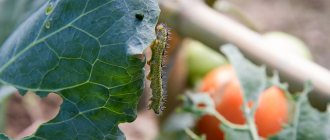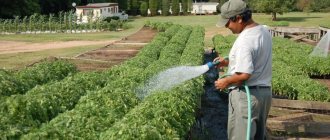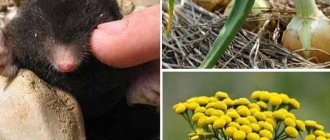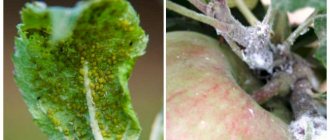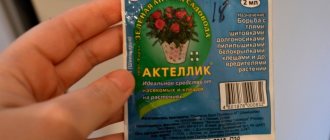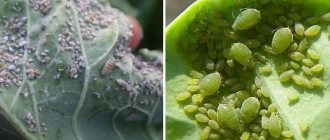Bell peppers are loved in our country and grown in regions with both warm and cold climates. They have learned to grow greenhouse varieties even in Siberia. This plant attracts vegetable growers with its taste and beneficial qualities of the fruit.
There is an urgent question about methods of controlling parasites on bell peppers - in particular, peppers are susceptible to attacks by aphids. In the article we will tell you the reasons for its appearance and how to fight aphids with folk and other means at home.
Why are aphids dangerous?
Aphids are insects from the order Homoptera, living in large colonies. It feeds on plant juices, causing enormous harm to vegetable crops. The main reason for the appearance of aphids on sweet peppers is considered to be the juiciness and wateriness of the fruits, which become excellent food for pests.
What harm does aphids cause:
- Insects feed on plant sap, disrupting the normal metabolism in pepper cells. As a result, the plant begins to lag in growth, becomes weak, frail and may die completely.
- Aphids secrete honeydew, a sticky substance that ants feed on. This is why huge colonies of ants immediately appear in beds with aphids, which are extremely difficult to get rid of.
- Excessive amounts of sweet honeydew lead to the formation of black mold - it disrupts the photosynthesis of the plant and inhibits its growth.
- Aphids are carriers of dangerous viral diseases that enter plant tissue when they bite a leaf and suck out the juice. Viral diseases tend to spread quickly; within a short time they affect not only pepper, but also neighboring beds.
Sticky honeydew sticks to the pepper leaves - this leads to the accumulation of dust and disruption of the full “breathing” of the leaf plates. As a result, the vegetable begins to wither, lag in growth and die.
Why do aphids appear?
There are several options for where aphids appear in the greenhouse:
- Ignoring pre-plant disinfection of the soil and walls of the greenhouse itself.
- Adding fresh manure to the beds before winter.
- Lack of control of ants, which can carry microscopic aphid larvae on their bodies.
- Seedlings purchased on the market are infected with aphid larvae, and the gardener forgets to disinfect them before planting them in the greenhouse.
- There are no preventive sprays that would protect the plant from pests.
Warmth and humidity create optimal conditions for the active development and reproduction of aphids. It is extremely difficult to recognize the problem in the initial stages. Actions come already when the plant noticeably slows down in its growing season.
In addition to the fact that aphids suck out nutrients, during their life processes they secrete honeydew, which is an excellent environment for the development of rot.
Signs of aphid damage to pepper
To effectively control aphids in bell pepper beds, it is very important to identify the pest in the early stages. Damage to vegetable beds can be determined by the following signs:
- curling, yellowing and falling leaves;
- poor bud setting;
- shedding of inflorescences;
- the sticky surface and shine of the leaves due to the sweet honeydew secreted by aphids;
- the appearance of dark dots on the back of the foliage - egg laying of aphids.
Bell peppers are an ideal food for aphids, so pest colonies rapidly increase in size. In just 3-4 weeks, a colony can grow to 8-10 thousand individuals, so the fight against insects must begin immediately.
Where do aphids come from?
Aphids overwinter in soil or fallen leaves. Pest eggs can also be stored in the bark of trees or shrubs. The awakening of adult individuals that have survived the winter occurs with the onset of warm days.
Ants contribute to the spread of the pest. They carry aphids from one bush to another and protect them because... The favorite food of ants is honeydew, a sticky sweet liquid that the parasites secrete.
It is useless to fight against one pest; single measures will not bring the desired effect.
How to get rid of pests
To combat aphids in the garden, you can use various methods - industrial preparations, folk remedies, biological methods. Each of them has its own advantages and features.
Folk remedies are best used for small numbers of pests. They are completely safe for bell peppers and the future harvest. In case of severe damage to the beds, chemical preparations are used that are highly effective and quick-acting.
To obtain a pronounced result, it is advisable to combine these control methods with biological ones - this will help get rid of insect pests on sweet peppers much faster.
Industrial products
In case of extensive infestation of bell pepper beds by aphids or the appearance of pests in the greenhouse, it is best to use fast-acting industrial preparations, since folk recipes in such cases may be ineffective.
Modern insecticides are characterized by minimal toxicity and, when used correctly according to the instructions, are completely safe for sweet peppers and the future harvest. In most cases, spraying with chemical insecticides allows you to get quick results after the first treatment of the beds.
Karbofos
Karbofos is a potent insecticidal preparation that is effective against aphids and a wide range of other garden pests. To combat aphids, Karbofos is used in liquid form - 1 tbsp. l. The drug must be dissolved in a bucket (10 liters) of water and sprayed on the affected plants.
Aktara
Aktara is a universal insecticidal preparation that can be used for pepper at any stage of the growing season. It helps destroy aphids on young seedlings and adult plants.
Pepper bushes should be treated twice, at intervals of a week. The exact dosage of Aktara is indicated in the instructions for its use. In no case should you exceed it, since the insecticide is classified as a product with degree III toxicity.
Fufanon
Fufanon is a broad-spectrum insecticide. The drug is highly effective in controlling the most common insect pests - moths, whiteflies, mites, moths and aphids.
Fufanon insecticide is available in the form of ampoules, which simplify the preparation of the solution. Dissolve one ampoule of the drug in 1.5-2 liters of water and spray the bell pepper. The garden should be cultivated only in dry, windless weather, preferably in the late evening.
If there are a large number of aphids, the solution can be made more concentrated - an ampoule for 1 liter of water.
Intavir
Intavir is a modern insecticidal agent produced in tablet form. The drug has a wide spectrum of action. It is effective against aphids, Colorado potato beetles, thrips, codling moths, leaf beetles and bedbugs.
To prepare the working solution, use 1 Intavir tablet per 10 liters of clean water. Spray the bell pepper generously with the resulting solution, trying to evenly treat all the leaves.
Aktellik
Actellik is one of the most effective and fast-acting insecticides with enteric contact action. This means that insect pests are killed both by eating the treated leaves and by normal contact with it.
Actellik is available in the form of ampoules, each of which is designed to be dissolved in 2 liters of water. This volume is quite enough to cultivate a bed of 10 m².
Fitoverm
Fitoverm is a safe biological preparation intended to control aphids and other pests on bell pepper seedlings. The product contains natural ingredients, so it does not cause any harm to young seedlings.
To prepare a working solution, dissolve one Fitoverm ampoule in 1 liter of water and use it to spray pepper seedlings. Complete death of the aphids occurs after 5-7 days. When processing, you need to ensure that the leaves of the plant are abundantly and evenly covered with the solution on both sides.
Folk remedies
Folk remedies are often used by gardeners to kill aphids and other insect pests. Such compositions are prepared from simple and accessible components that are safe for vegetable crops and future harvests. The only drawback of such products is their lack of effectiveness against extensive aphid infestations.
Laundry soap
The soap solution helps clean bell pepper leaves from aphids and prevents their reappearance. To prepare the solution, grate a bar of soap, then pour 50 grams of the resulting mass into 10 liters of water.
Leave the liquid to infuse for 6-7 hours, then pass through a sieve or cheesecloth. Use the solution to wipe or spray the pepper leaves. To completely get rid of aphids, it is necessary to carry out at least 3-5 treatments.
Baking soda
Laundry soap can be combined with baking soda; it significantly increases the effectiveness of the soap solution. To prepare it, an increased concentration is used - 40 grams of grated soap and 20 grams of soda per 1 liter of water.
Wood ash
A highly effective product that will not only rid the beds of aphids, but also additionally feed the plants, because wood ash is one of the best organic fertilizers.
To prepare it, dissolve 2 cups of ash in 10 liters of water and add ½ cup of soap solution. The mixture should sit for at least 24 hours, after which it can be used to spray bell pepper bushes.
You can use tobacco instead of soap. In this case, 25 grams of tobacco powder should be mixed with the same amount of ash and pour 1 liter of water.
Spruce needles
An infusion of spruce needles is an effective and natural remedy that can be used to protect bell peppers both in open ground and in a greenhouse. The method for preparing the infusion is very simple - pour 1 kg of spruce needles into 4 liters of water and leave to infuse for 6-7 days.
The infusion must be diluted before use. To do this, dissolve 40-50 ml of concentrate in 1 liter of clean water and use it to spray sweet pepper bushes.
Ammonia
Ammonia is an effective and affordable pharmaceutical product, widely used in the garden.
Unlike other folk remedies, ammonia does not repel insect pests, but causes their death by penetrating through the respiratory system.
Method for preparing the solution: dissolve 1 tablespoon of ammonia in 5 liters of water. Add a teaspoon of dish soap or liquid soap. Mix well and use to spray the affected pepper leaves.
Hot red pepper
To prepare a solution for aphids, you can use both dried paprika and fresh bitter fruits. In the first case, you will need 300 grams of spices, in the second - 1 kg of peppers. Fill with a bucket of water.
Leave the liquid to infuse for 24 hours. The solution must be diluted before use, otherwise it may burn the pepper leaves. To do this, 1 liter of pepper concentrate must be dissolved in 10 liters of water.
Vegetable oil
Olive or sunflower oil is an effective remedy for preventing the appearance of aphids in beds with bell peppers, as well as for controlling pests that have already appeared. To do this, prepare a solution of 100-150 ml of vegetable oil per 5 liters of water. This solution can be used to spray or wipe down pepper foliage.
Onion
Aphids do not tolerate the pungent odor of onions, so it can also be used to control aphids on sweet peppers. Peel and finely chop 3-5 onions, then add onion skins and 1 liter of hot water. Cover with a lid and leave to steep for 4-5 hours.
After infusion, pour 5 grams of grated laundry soap into the prepared product, mix thoroughly and filter through gauze. Use the infusion to treat beds with bell peppers.
Tomato tops
Tomato tops are used by many summer residents to combat aphids, Colorado potato beetles and other garden pests. To make the solution, finely chop the tomato tops, then pour 500 grams of the resulting mass into 5 liters of water and leave to steep for 5-6 hours.
Place the bucket of infusion on low heat, boil and leave to infuse for another 3-4 hours. Before use, dilute the concentrated solution with clean water in a ratio of 1:3.
Mustard powder
To get rid of aphids in beds with bell peppers and other vegetable crops, you can use dry mustard powder. Pour 35-40 grams of powder into 500 ml of hot water and leave to infuse for 3 days.
Pour clean water into the mustard infusion so that the total volume is 10 liters. Use to spray or wipe sweet pepper leaves.
Why is it dangerous to treat seedlings with chemicals?
Chemical preparations effectively deal with adult insects and larvae, but spraying seedlings with insecticides is dangerous. Substances contain toxic components:
- pyrethroid;
- organophosphorus elements;
- neonicotinoid.
This can cause allergies and poisoning of animals and people. Preparation of working fluids requires strict adherence to the instructions: an overdose often provokes burns of leaf plates and the death of young seedlings. Spraying is carried out in protective clothing, wearing a respirator, gloves, and goggles.
Other ways to fight
To effectively kill aphids on bell peppers, you can use biological control methods. These include attracting natural enemies of aphids to the beds:
- sparrows;
- tits;
- kings;
- linnet;
- ladybugs;
- flower girls;
- lacewings.
These beneficial insects are attracted by the aroma of fragrant plants - lavender, chamomile, marigold, parsley, yarrow.
Aphids can be collected by hand. This is an effective, but time-consuming and labor-intensive way to combat insects in the garden. Manual collection of pests is only suitable for small areas.
How to kill aphids in a greenhouse
Greenhouse conditions are suitable for the reproduction of parasites. Lack of regular ventilation, elevated temperature, and high humidity accelerate the development of larvae and enhance population growth. To destroy bugs indoors, they use biological products and folk remedies that are used to treat bushes at home and in garden beds. Plants are sprayed for 3–6 days, at any time, regardless of the weather and time of day. The sooner you start fighting parasites, the more noticeable the effect of the procedures will be.
Additional Information! To prevent the appearance of aphids in the greenhouse, marigolds, calendula, garlic or onions are planted around the structure. Tools and shelves are wiped with diluted bleach or hydrogen peroxide. In the fall, the greenhouse is fumigated with smoke bombs.
How to fight at different stages of development
The fight against aphids has a number of features and nuances depending on the stage of vegetative development of bell pepper. This is especially important when using industrial preparations, because products intended for treating adult bushes cannot always be used for pepper seedlings.
On seedlings
To combat aphids on bell pepper seedlings, it is best to use effective and safe folk remedies. They are completely harmless to young seedlings and increase their resistance to diseases and insect pests.
A solution of wood ash, tobacco, mustard powder or laundry soap gives a good effect. Folk remedies can be combined with biological methods - for example, collecting pests by hand.
In the greenhouse
Aphids attack beds with bell peppers not only in open soil, but also in greenhouses. Optimal conditions for the development of vegetable crops have been created here - high temperature and humidity, absence of direct sunlight and piercing wind. This microclimate is ideally suited for the active reproduction of aphids, therefore, in greenhouse conditions, sweet peppers are affected by pests much more often.
To combat aphids in a greenhouse, you can use both folk and industrial means. The latter help to get faster and more noticeable results. Spraying bell peppers can be carried out in any weather conditions, since the beds are reliably protected from wind and precipitation.
In the open ground
To kill aphids in open beds, you can use all of the above means. In the initial stages of damage, the most effective will be folk remedies used for spraying bushes.
Processing beds in open ground should be carried out in the evening, after sunset, in dry and windless weather.
In case of severe insect infestation, industrial preparations - Aktara, Karbofos, Actellik - will be more effective. Insecticides are used in strict accordance with the instructions and compliance with all safety measures.
Prevention of aphids
It is easier to prevent aphids from appearing than to deal with the existing problem later. There are several preventative measures that will help avoid the occurrence of the pest:
- Before planting peppers, disinfect the soil - for this you can use a solution of potassium permanganate, put the soil in the freezer for a while, or vice versa, thoroughly warm the soil, etc.;
- treat pepper seeds with a special substance before planting;
- Wash seedling containers thoroughly;
- do not place the plant in a room with indoor flowers;
- Fertilize the crop regularly, since a healthy bush can better resist parasites and pathologies;
- treat the pepper with any preparation that prevents the appearance of aphids.
Find out when to plant pepper seedlings in the Urals here.
Preventive measures
Competent prevention helps strengthen the immunity of bell peppers and protect them from aphids and other insect pests.
Effective rules of prevention:
- Proper soil preparation - before planting bell peppers, it must be disinfected. This can be done by freezing or heating, pouring a solution of potassium permanganate or a strong infusion of garlic.
- Choice of variety – for sowing, it is best to choose pepper varieties with high resistance to diseases and pests (Eroshka, Yunga, Triton, Zdorovye). Before planting seedlings, seeds must be disinfected in a solution of potassium permanganate.
- Treatment with stimulants - such preparations not only accelerate seed germination and rooting of seedlings, but also strengthen its immunity. The most popular stimulants include Epin, Zircon, Heteroauxin. Seeds are soaked in a stimulant solution before sowing, and the roots of seedlings are soaked before planting in a permanent place.
- Surface treatment - when growing bell peppers in a greenhouse, you need to treat not only the beds, but also all structural elements. To do this, you can use potassium permanganate, caustic soda or chlorine.
- Garden neighbors - for effective prevention against the appearance of aphids, it is advisable to place bell peppers next to strong-smelling plants. These include marigolds, fennel and dill, cloves, coriander, onions and garlic, which repel insects with their rich aroma. Find out more about which crops can be planted next to peppers here.
Aphids are one of the most common and dangerous insects that parasitize bell peppers. This pest feeds on plant sap, causing wilting, frailty, stunting and even death of the plant. To combat aphids on peppers, you can use industrial preparations, folk recipes and safe biological methods to quickly clear the beds of pests and preserve the harvest.
Aphids: description and types
Both in greenhouses and in open ground, aphids on peppers multiply very quickly. Its colonies cause significant damage to plants and can even cause their death.
Scientists have classified about 4 thousand species of aphids. Almost all of them are not particularly picky when it comes to food and can attack any plant.
The insect is small in size; its round or oval body can reach a length of several millimeters. The aphids that attack vegetable crops grown in open ground are slightly larger than those that live on indoor plants.
The color of insects can be different:
- black or green;
- red or pink;
- brown or transparent.
In most cases, it resembles the color of the leaves and flowers that the pest infects. There are hairs and growths on the insect's body.
The feeding organ of aphids is the proboscis, which serves to pierce the shell of the trunk and leaves, with its help the insect sucks out the juice. Three pairs of legs allow pests to move quickly in search of food; some individuals have wings and jump well.
The most common types of aphids that can be found on the site are:
- potato and cabbage;
- apple and cherry;
- pea and carrot;
- root and leaf.
Even such a toxic plant as tobacco can be affected by aphids, tobacco.
The pest is widespread and migrates easily. Pepper can infect several varieties at once.
Ash with tobacco
Used for applying to the stems and succulent foliage of pepper. Recipe:
- 50 g wood ash;
- 50 g tobacco;
- 2 liters of water;
- 2 tbsp. l. liquid soap.
Pepper varieties for open ground: 6 best options for 2020
Process: dilute wood ash with tobacco in liquid. Mix the ingredients thoroughly and let the mixture brew for 4 days. Strain the large particle remover through a sieve. Add and dissolve liquid soap. Fill the garden sprayer and spray the seedlings over the entire surface.
Methods for controlling sap-sucking insects
A summer resident must know what to do when aphids appear. The choice of funds is large. It is necessary to correctly assess the degree of damage and choose the most optimal one.
Benefits of chemicals
Any chemical is effective. The insecticides included in the composition have a wide spectrum of action. They are able to quickly remove insects from peppers. Advantages of modern chemical preparations for aphids on peppers:
- begin to act on pests a few minutes after treatment;
- To completely destroy a pest colony, 2 treatments are enough;
- The recipe for preparing solutions is simple, given in the instructions for the drug;
- 3 weeks after spraying, the fruits can be eaten.
Safety of biological agents
The basis of the action of biological products is organic substances. They kill aphids but are not harmful to humans, pets or bees. Chemical preparations cannot be used during flowering, but biological ones can.
See also
What to do if pepper leaves curl, proper care and treatment
Read
Biological agents can be used to control aphids at home. It is very comfortable. With their help, you can quickly get rid of aphids on pepper seedlings. These preparations can be sprayed on bushes during the fruiting period. After 5 days the fruits can be eaten.
What is an insect
Aphids are small insects with six legs, whose dimensions do not exceed 4 mm.
It is characterized by a high rate of spread. On the head there is a small proboscis, with the help of which the insect pierces leaves or stems and feeds on nectar. There are two types of aphids - winged and wingless. In the first case, the parasite has the ability to move from plant to plant through the air.
Aphids are also distinguished by color. Depending on the color, the following types are distinguished:
- Green. It is a pest with an oval translucent body and brown antennae. The length of the body is on average 0.5 mm.
- Black. This is an indoor pest. Typically the parasite grows to 0.3 mm.
Adults reproduce as follows:
- the pest lays eggs - their number in one clutch can reach 150 pieces;
- the masonry waits out the winter;
- the larvae hatch with the onset of warm weather;
- It takes them seven days to mature and after a week they become adults;
- the adult insect begins to reproduce asexually;
- the aphid takes wings and moves to other bushes;
- During the autumn months, insects reproduce sexually.
Find out about poor growth of pepper seedlings here.
Reproduction occurs best at a temperature of 25-30 °C. When it drops below 20 °C, the speed decreases by 2 times. In addition, the process of maturation of adults increases.
Causes and signs of appearance
The juicy leaves of young peppers themselves attract aphids.
The likelihood of a pest attack increases for three reasons:
- the insect eggs overwintered near the planting site;
- the seedlings were sold along with the pest larvae;
- the aphids were attracted by the ants.
The disease manifests itself as follows:
- insects and eggs live on the inside of the foliage;
- a sticky coating covers the green parts of the plant;
- the leaves dry and curl up.
